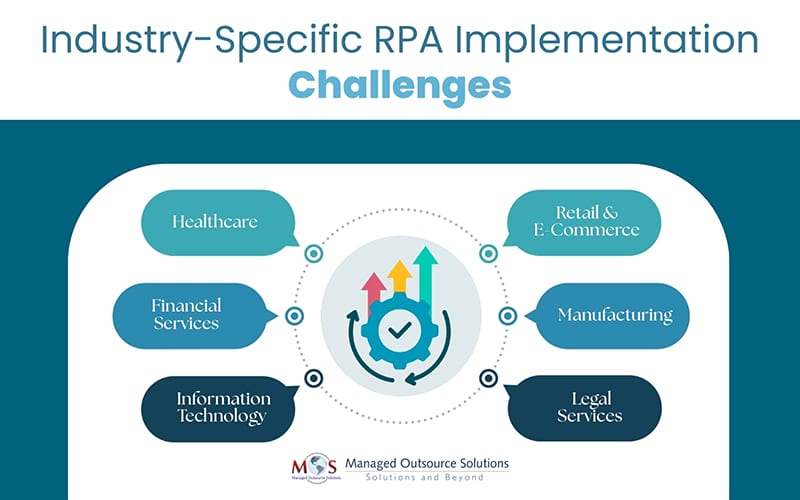Over the past few years, Robotic Process Automation (RPA) became the top automation tool, often pitched as the plug-and-play path to higher efficiency, lower costs, and better ROI. While RPA has definitely changed how companies operate by streamlining repetitive, rule-based tasks, it is not without its challenges. In fact, a study by Ernst & Young revealed that around 50% of RPA deployments never reach full implementation, often stalling before they can demonstrate measurable value. This failure is not because of the technology itself, but rather how it is implemented and managed. In response, many firms fixate on trying to fix only the most obvious hurdles, including poor process selection, lack of a strategy, or scaling too quickly.
However, in reality, RPA implementation for businesses operating across various industries faces its own unique blend of technological, operational, and regulatory challenges that they must be aware of. By identifying the industry-specific hurdles, you can anticipate when to implement RPA into your processes and adopt a tailored approach that ensures successful outcomes. Partnering with experts who provide end-to-end robotic process automation services is a practical way to navigate these complexities, avoid common pitfalls, and achieve sustainable automation success.
Industry-Specific Challenges in Robotic Process Automation Implementation
Here are the industry-specific obstacles in robotic process automation adoption that companies working across sectors should plan for:
Healthcare
With the global RPA market in healthcare estimated to reach $14.18 billion by 2032, it comes as no surprise that RPA implementation in healthcare systems requires careful considerations. Key challenges include:
- Data Privacy and Compliance: Automating processes that manage patient records means strict adherence to privacy laws and HIPAA to protect sensitive information. RPA tools in healthcare must be configured to handle stringent data processing, storage standards, and robust security measures. Even a small lapse in healthcare data security can result in severe consequences such as regulatory penalties, legal disputes, and loss of patient trust.
- RPA Integration with Legacy Systems: RPA implementation creates compatibility issues as many hospitals still use older EHR systems that lack easy integration points with modern automation tools. This makes automating processes more complex and costly, as it requires initial significant investments in updating outdated systems and purchases of custom connectors or middleware.
- Exception-heavy Processes: Healthcare workflows are sophisticated and require case-by-case judgment of patient records, which bots can’t replicate. This makes automation complicated as tasks have to be separated into ones which require careful clinical decision-making and high-volume, repetitive, and rule-based administrative work that needs automation.
Financial Services
Automation is a leading trend in the financial sector, as evidenced by the Grand View Research which reported that the BSFI (Banking, Financial Services, and Insurance) sector accounting for the largest share of global RPA market revenue. However, as automation expands, financial data security in RPA has emerged as a crucial concern. Key challenges include:
- Heavy Regulations: Banking, insurance, and investment firms operate under a strictly regulated environment as they handle personal financial data that must be protected from data breaches. Integrating automation into financial processes requires expertise in data protection as a single compliance mistake can trigger costly investigations and damage brand reputation. Automation testing using specialized software tools must include regulatory checks before deployment to ensure overall security of financial data.
- Zero Margins for Error: Even a small data mismatch in a financial transaction can have catastrophic consequences such as financial losses and eroded customer trust. This makes robust validation, exception handling, and reconciliation processes essential for financial data integrity. Without these safeguards, automation of financial workflows can amplify errors such as data leakage or fraud instead of preventing them.
Information Technology (IT)
As one of the earliest adopters of automation, the IT sector leverages RPA to streamline help desk operations, software deployment, and infrastructure management. However, despite its technological maturity, several IT process automation pitfalls can hinder RPA success. Key challenges include:
- Too Many Process Variations: IT teams often operate in dynamic and diverse ways, with variations in data inputs, applications, and operating systems. These variations make it tough to create standard automation scripts. Without consistent workflows, bots have to be customized for each scenario, which increases complexity and costs. Standardization of IT processes before automation is critical to avoid spiraling project timelines.
- Security Risks: Bots in IT environments may need admin-level access to communicate with other systems and platforms. If security is compromised with weak encryption methods or access controls, bots could put customer data at risk by exposing sensitive information to authorized users and executing malicious actions at scale. These vulnerabilities make features such as strong identity management, secure logging, and robust access control policies non-negotiable for software companies.
- Constant Change: Frequent system updates, patches, and migrations can confuse pre-programmed bots and break carefully built automations overnight. This leads to downtime, rework, and frustrated teams. Building flexible, modular automation scripts that can be easily updated or reconfigured to adapt to system changes help to build a proper maintenance plan.
Retail and E-commerce
With online retail expanding at unprecedented speed, the role of RPA in handling order processing, customer service, and inventory management is growing. Key challenges include:
- Seasonal Demand Fluctuations: Retail sales cycles often spike during holidays, promotional campaigns, and seasonal events, requiring automation systems to handle sudden surges in transactions. If bots are not built for scalability, they may underperform, resulting in slower processing times or transaction failures during peak demand.
- Product Data Complexity: Retailers manage vast catalogs with varying attributes such as sizes, colors, and regional availability. Maintaining consistency across platforms such as ERP, CRM, and online storefronts is complex, as even minor data discrepancies can confuse both customers and bots. Data normalization and catalog standardization are critical before automating these processes.
Manufacturing
The manufacturing sector is a key player in the global RPA market, ranking at the fifth spot in 2024. Key challenges include:
- Operational Integration: Many manufacturing companies rely on old shop-floor machinery systems and equipment that may be not compatible with automated systems. Integration of RPA tools with these outdated systems is challenging as each interface or machine requires a unique integration approach. Moreover, ensuring seamless communication between different systems creates complexities such as delayed implementation or limited scalability.
- Data Inconsistency: Manufacturing operations are complex, interconnected, and produce large databases involving multiple departments, machines, production details, inventory logs, and customer data. This may create discrepancies between manual logs and digital records, and confuse bots. Poor data quality and automation failures can cause obstacles such as inaccurate reporting, shipping delays, and misinformed decisions.
- Downtime: Any halt in manufacturing operations due to equipment failures, system outages, or unplanned maintenance can disrupt RPA workflows. Bots designed to process real-time data or coordinate production schedules may fail when inputs stop, leading to backlogs once systems are back online. In such scenarios, recovery scripts, backup automations, and contingency workflows become essential to ensure business continuity. Without these measures, manufacturing automation downtime can translate into significant financial loss and delayed order fulfillment.
Legal Services
Law firms can leverage RPA to handle a range of functions from legal document review, contract analysis to legal research and compliance monitoring. Key challenges include:
- Document Diversity: Legal work involves dealing with wide varied document formats including contracts, fillings, and forms, making the legal process highly intricate. Legal documents contain nuanced terminology, context-specific clauses, and conditional logic that bots may misinterpret. Moreover, bots may struggle with inconsistent formats and unstructured data, leading to errors or missed information that may be critical to legal cases.
- Confidentiality Concerns: Law firms and in-house legal departments operate under rigorous confidentiality agreements, data privacy laws, and professional conduct rules. However, many law firms remain dependent on legacy systems that are not compatible with modern RPA tools, putting the data at security risks. Even a minor breach could not only trigger legal action, severe penalties, but also violate client trust and cause reputational damage.
Overcome RPA Implementation Challenges with Outsourcing
RPA implementation promises efficiency, cost savings, and scalability for companies across industries. However, success depends on recognizing that each sector brings its own challenges that must be tackled with a customized strategy. In such cases, partnering with an experienced RPA company can significantly reduce the risks and complexities of automation projects. By selecting the right RPA partner for industry-specific needs, businesses gain access to skilled professionals who understand industry-specific regulations and best practices.
RPA Implementation Challenges and How to Fix Them
Outsourcing also accelerates deployment timelines, as service providers bring proven frameworks and ready-to-use automation components. This approach allows internal teams to focus on strategic goals while experts handle technical execution and maintenance. Whether it’s healthcare compliance, financial accuracy, or manufacturing integration, a trusted third party vendor can help organizations overcome challenges and unlock the full potential of automation.
Partner with our expert RPA services to maximize business efficiency and ROI!





